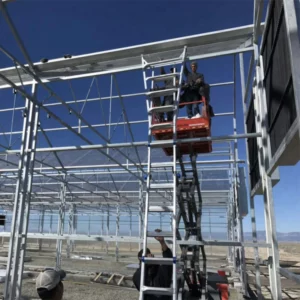Blackout Polycarbonate Greenhouses contribute to improved crop yield and quality through several key mechanisms that provide a controlled and favorable environment for plant growth.
Here are ways in which these greenhouses impact crop productivity and quality:
- Precise Light Control:
- Blackout systems in Polycarbonate Greenhouses enable precise control over light exposure. The ability to create blackout conditions regulates the photoperiod, allowing growers to manipulate day-length for specific crops. This control enhances flowering, fruiting, and overall plant development, leading to improved yields.
- Optimized Growing Conditions:
- Blackout Polycarbonate Greenhouses provide an optimized growing environment by regulating temperature, humidity, and light intensity. These controlled conditions create a stable climate, reducing stress on plants and promoting consistent growth, ultimately contributing to better crop quality.
- Enhanced Climate Management:
- The ability to completely or partially blackout the greenhouse allows for better control over temperature fluctuations. This is especially beneficial during extreme weather conditions, contributing to a more stable climate that supports optimal crop growth and quality.
- Reduced Pest and Disease Pressure:
- Blackout systems help in preventing the entry of pests and diseases during the blackout period. This physical barrier reduces the risk of infestations, promoting a healthier crop with fewer instances of damage and diseases.
- Uniform Growth and Development:
- The controlled environment created by blackout systems leads to more uniform growth and development across the entire crop. This uniformity contributes to consistent harvests, China Polycarbonate Greenhouses suppliers making it easier for growers to plan and manage production.
- Increased Photosynthetic Efficiency:
- Blackout systems can be adjusted to optimize light conditions for photosynthesis. This contributes to increased photosynthetic efficiency, resulting in better utilization of light energy for plant growth and enhanced crop yield.
- Improved Water and Nutrient Use Efficiency:
- The controlled environment provided by blackout greenhouses helps in optimizing water and nutrient use. Growers can implement efficient irrigation and fertilization practices tailored to the specific needs of the crops, leading to improved resource use efficiency and higher quality produce.
- Reduced Environmental Stress:
- Blackout systems minimize environmental stress factors such as sudden temperature changes, excessive light exposure, or extreme weather events. Reduced stress allows plants to allocate more energy towards growth and development, positively impacting crop yield and quality.
- Extended Growing Seasons:
- Blackout systems extend the potential growing seasons by allowing growers to manipulate day-length. This feature is particularly advantageous for cultivating crops that require specific day-length conditions for flowering and fruiting, leading to increased yields.
- Enhanced Flowering and Fruit Set:
- The ability to create blackout conditions during critical stages of the growth cycle, such as flowering and fruit set, contributes to enhanced reproductive processes. This can result in more flowers, improved pollination, and ultimately higher yields of high-quality fruits.
- Quality of Harvested Produce:
- Controlled light exposure and optimized growing conditions contribute to better color, flavor, and texture of harvested produce. The overall quality of the crop is improved, making it more marketable and appealing to consumers.
- Year-Round Production:
- Blackout Polycarbonate Greenhouses enable year-round production by providing a consistent and controlled environment. This continuous cultivation allows for a steady supply of crops, contributing to a more reliable and sustainable production system.
In summary, blackout Polycarbonate Greenhouses offer growers the ability to create a controlled and customized environment that positively influences crop yield and quality. By managing light exposure, temperature, and other environmental factors, these greenhouses provide an ideal setting for maximizing the potential of plant growth and ensuring a high-quality harvest.

How do blackout Polycarbonate Greenhouses contribute to improved crop yield and quality?